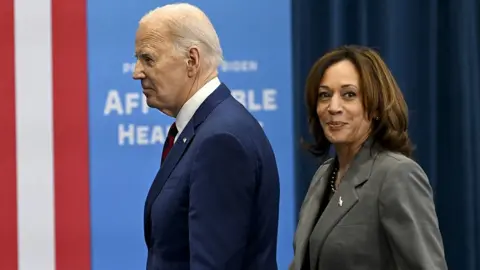
 Getty Images
Getty ImagesPresident Joe Biden has dropped out of the US election race and announced his support for Vice-President Kamala Harris to take his place as the Democratic Party's nominee.
The decision throws the party into uncharted waters with just a month to go before the Democratic National Convention, when their choice will be confirmed.
Is Biden still the US president?
Yes, he has only ended his campaign to be re-elected to the White House on 5 November.
He has pledged to remain president until his successor is formally inaugurated in January.
However, Mr Biden faces calls from senior Republicans, including from House Speaker Mike Johnson, to step down now.
Is Kamala Harris now the Democrats’ presidential candidate?
There is no guarantee that VP Kamala Harris will simply take Mr Biden's place as the Democrats' nominee for president.
Mr Biden was due to be officially confirmed this summer, after winning the support of a majority of delegates during recent primary contests. Delegates are people who are selected to represent their electoral area at the Democratic National Convention (DNC), the party's key nominating event.
Although Mr Biden endorsed Ms Harris to take his place as the Democratic nominee, it will be up to the delegates to decide who they are backing.
However, she was on the same ticket as Mr Biden, and his endorsement does make her the most likely pick.
What's more, as our North America editor Sarah Smith writes, the party appears to be coalescing around Ms Harris, which could make her unassailable given that no serious challengers are putting up a fight.
The situation is without modern precedent. The last time an incumbent US president abandoned their campaign for re-election was Lyndon Baines Johnson in 1968.
Could other candidates come forward and how will the nominee be chosen?
As calls grew for Mr Biden to drop out of the race in recent weeks, a number of potential replacements emerged.
Michigan's Democratic Governor Gretchen Whitmer was floated as a candidate, though she has said she would not consider running if Mr Biden stepped aside. On Sunday, minutes after Mr Biden's announcement, she said she would do everything she can "to elect Democrats and stop Donald Trump".
And some other rumoured replacements have since rallied behind Ms Harris - including California Governor Gavin Newsom, Transportation Secretary Pete Buttigieg and Pennsylvania Governor Josh Shapiro.
The DNC is scheduled to begin on 19 August. If the party does not come together to support a single candidate, that could set the stage for an open convention for the first time in decades.
That would mean delegates would be free to decide who to vote for among multiple candidates if they emerge.
Candidates would need signatures from at least 300 delegates - no more than 50 coming from one state - for their name to appear on the ballot.
There would be an initial round of voting among the 3,900 pledged delegates, which includes voters deemed loyal to the Democratic Party.
If no candidate receives a majority of votes after this first round, then more rounds of voting would take place. These rounds would include superdelegates, party leaders and elected officials, who would all cast ballots until a nominee is chosen.
To secure the party nomination, a candidate needs 1,976 delegate votes.
How does the winning candidate make their VP pick?
This tends to be a less formal process than the choice of presidential nominee, CNN reports - with the person selected by the nominee generally accepted as their running mate.
If Ms Harris does take Mr Biden’s place at the top of the Democratic ticket, some of the names being discussed as her running mate include some of the prominent Democrats mentioned above, including Mr Shapiro, and others such as Illinois Governor JB Pritzker and Arizona Senator Mark Kelly.
Her running mate would become her future vice-president if she wins office.
What happens with the money pledged to Biden?
Because Ms Harris was part of the same electoral ticket as Mr Biden, campaign finance experts have suggested that the nearly $100m (£73m) he has amassed could flow directly to her if she does become the Democrats' nominee.
This was "not an open question,” Dara Lindenbaum, a commissioner on the Federal Election Commission, told the New York Times. “It’s very clear,” she added.
However, Republicans have signalled that they plan to challenge this transfer of funds, pointing out that Mr Biden was not yet officially his party's nominee when he dropped out of the White House race.
If the nominee turns out to be someone other than Ms Harris, it is less clear what happens to the funds accrued by the Biden-Harris campaign.


















